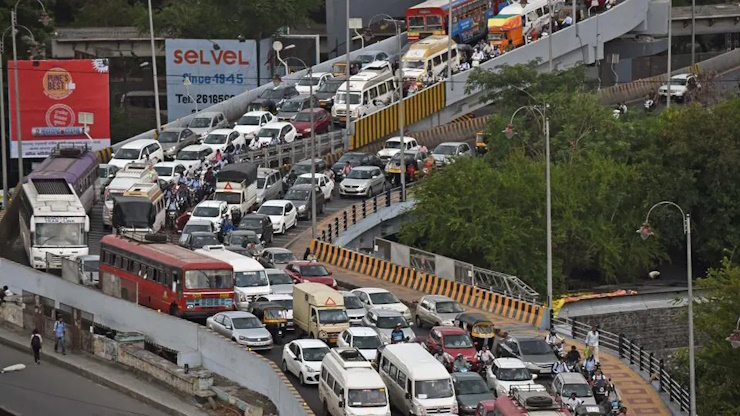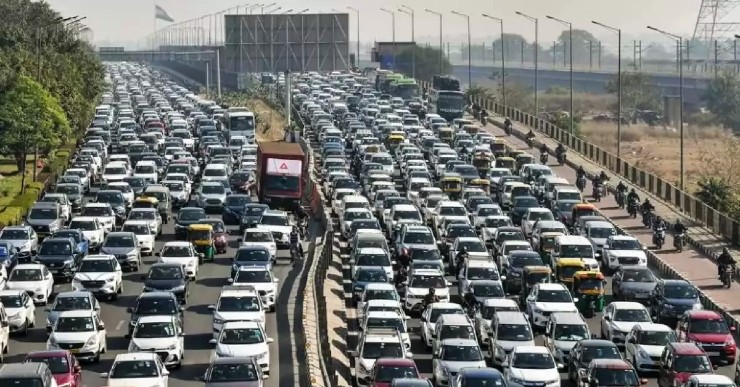TomTom Traffic Index Lists Bengaluru, Pune As Slowest Indian Cities in Top-10
In the realm of urban traffic dynamics, London emerged as the “slowest city to drive through” globally in 2023, according to the latest TomTom Traffic Index. The report, compiled by Amsterdam-based location technology specialist TomTom, scrutinized 387 cities spanning 55 countries and six continents. This comprehensive evaluation factored in average travel time, fuel costs, and CO2 emissions. The findings, derived from data collected from over 600 million in-car navigation systems and smartphones, unveiled London’s sluggish average speed of 14 km/h during rush hour, positioning it at the bottom of the speed charts.
The TomTom Traffic Index meticulously calculated the average travel time per kilometer by analyzing millions of kilometers covered throughout the entirety of 2023. London’s drivers grappled with an average of 37 minutes and 20 seconds to cover a 10 km distance, setting a benchmark for slow-paced urban commuting. Dublin in Ireland secured the second spot, with Toronto in Canada rounding out the top three slowest cities.
Remarkably, two Indian cities, Bengaluru and Pune, found a place in the top 10, securing the 6th and 7th positions, respectively. Bengaluru drivers faced an average travel time of 28 minutes and 10 seconds to traverse 10 km, navigating at an average speed of 18 km/h during rush hour. Pune, closely following, recorded an average time of 27 minutes and 50 seconds, maintaining a slightly faster average speed of 19 km/h in peak traffic.

Delhi and Mumbai represented additional Indian cities in the rankings, holding the 44th and 54th positions, respectively. Delhi showcased an average travel time of 21 minutes and 40 seconds for a 10 km distance, while Mumbai recorded an average travel time of 21 minutes and 20 seconds for the same journey.
These findings underscore the complex challenges posed by traffic congestion in some of India’s prominent cities. Despite their global recognition for being among the slowest cities to drive through, Bengaluru and Pune’s placement highlights the need for strategic urban planning and interventions to alleviate traffic woes and enhance commuting experiences. As cities continue to grow rapidly, optimizing urban mobility becomes paramount, and insights from studies like the TomTom Traffic Index contribute to informed decision-making for sustainable urban development.
Both Bengaluru and Pune now have functioning Metro transit systems, which are meant to get cars off the road. However, the Metro transit network is yet to cover most parts of these cities, and remains a work in progress. While public transport in Bengaluru is much better than that of Pune, it still falls short of larger metros such as Delhi, Mumbai and Chennai.
In the realm of urban traffic dynamics, London emerged as the “slowest city to drive through” globally in 2023, according to the latest TomTom Traffic Index. The report, compiled by Amsterdam-based location technology specialist TomTom, scrutinized 387 cities spanning 55 countries and six continents. This comprehensive evaluation factored in average travel time, fuel costs, and CO2 emissions. The findings, derived from data collected from over 600 million in-car navigation systems and smartphones, unveiled London’s sluggish average speed of 14 km/h during rush hour, positioning it at the bottom of the speed charts.

The TomTom Traffic Index meticulously calculated the average travel time per kilometer by analyzing millions of kilometers covered throughout the entirety of 2023. London’s drivers grappled with an average of 37 minutes and 20 seconds to cover a 10 km distance, setting a benchmark for slow-paced urban commuting. Dublin in Ireland secured the second spot, with Toronto in Canada rounding out the top three slowest cities.
Remarkably, two Indian cities, Bengaluru and Pune, found a place in the top 10, securing the 6th and 7th positions, respectively. Bengaluru drivers faced an average travel time of 28 minutes and 10 seconds to traverse 10 km, navigating at an average speed of 18 km/h during rush hour. Pune, closely following, recorded an average time of 27 minutes and 50 seconds, maintaining a slightly faster average speed of 19 km/h in peak traffic.

Delhi and Mumbai represented additional Indian cities in the rankings, holding the 44th and 54th positions, respectively. Delhi showcased an average travel time of 21 minutes and 40 seconds for a 10 km distance, while Mumbai recorded an average travel time of 21 minutes and 20 seconds for the same journey.
These findings underscore the complex challenges posed by traffic congestion in some of India’s prominent cities. Despite their global recognition for being among the slowest cities to drive through, Bengaluru and Pune’s placement highlights the need for strategic urban planning and interventions to alleviate traffic woes and enhance commuting experiences. As cities continue to grow rapidly, optimizing urban mobility becomes paramount, and insights from studies like the TomTom Traffic Index contribute to informed decision-making for sustainable urban development.
Both Bengaluru and Pune now have functioning Metro transit systems, which are meant to get cars off the road. However, the Metro transit network is yet to cover most parts of these cities, and remains a work in progress. While public transport in Bengaluru is much better than that of Pune, it still falls short of larger metros such as Delhi, Mumbai and Chennai.
